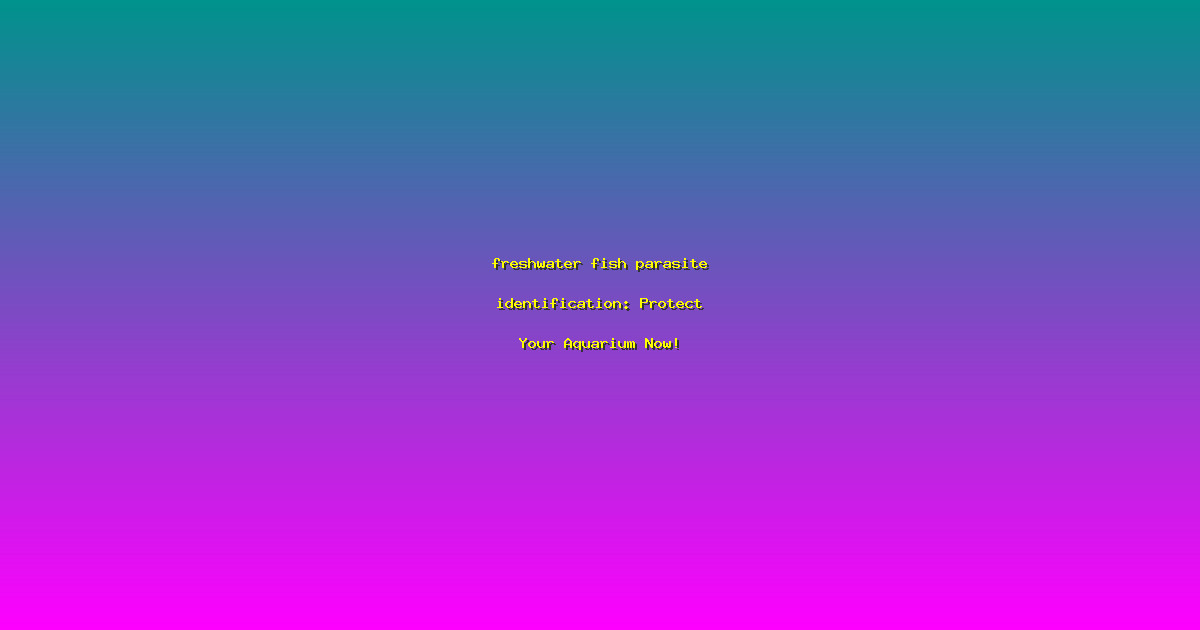freshwater fish parasite identification: Protect Your Aquarium Now!
Imagine your aquarium as a vibrant ecosystem, teeming with life and color. But lurking beneath the surface, unseen dangers can threaten the health and well-being of your aquatic friends. Freshwater fish parasites are a common issue that can cause stress, illness, and even death in your fish. Identifying these parasites early is crucial to maintaining a healthy aquarium. In this article, we’ll explore the world of freshwater fish parasite identification, providing you with the knowledge and tools to protect your aquatic pets.
Understanding the Threat: Common Freshwater Fish Parasites
Parasites can come in many forms, from tiny protozoans to larger crustaceans. Here are some of the most common parasites that can affect your freshwater fish:
- Ichthyophthirius multifiliis (Ich): This is one of the most common parasites, causing white spots on the fish’s body. According to the American Veterinary Medical Association, Ich affects up to 40% of aquarium fish.
- Costia: This parasite causes a slimy appearance on the fish and can lead to rapid breathing and lethargy. It is particularly dangerous in young fish.
- Anchor Worms: These are crustacean parasites that attach to the fish’s body, causing open wounds and infections. They are more common in outdoor ponds but can also be found in aquariums.
Identifying Parasites: Symptoms and Signs
Recognizing the signs of parasitic infection is the first step in protecting your fish. Here are some key symptoms to look out for:
- Visible Parasites: Some parasites, like anchor worms, are visible to the naked eye. Look for small, thread-like structures attached to the fish’s body.
- Behavioral Changes: Fish may become lethargic, lose their appetite, or exhibit erratic swimming patterns. These changes can indicate stress and illness.
- Physical Symptoms: Look for signs such as white spots (Ich), slimy patches (Costia), or open wounds (Anchor Worms).
Treatment and Prevention: Steps to Take
Once you’ve identified a potential parasite, it’s crucial to act quickly to prevent the spread and treat the affected fish. Here are some steps you can take:
- Quarantine: Isolate the affected fish to prevent the spread of parasites to other fish in the tank.
- Medication: Use appropriate treatments such as copper-based medications for Ich or salt baths for Costia. Consult with a veterinarian or experienced aquarist for the best course of action.
- Preventive Measures: Regular water changes, maintaining proper water parameters, and avoiding overfeeding can help prevent parasitic outbreaks.
Frequently Asked Questions
How can I prevent parasitic infections in my aquarium?
Preventing parasitic infections involves maintaining a clean and healthy environment. Regular water changes, proper filtration, and avoiding overfeeding can significantly reduce the risk of parasitic outbreaks. Additionally, quarantine new fish before introducing them to the main tank to prevent the introduction of parasites.
What are the most effective treatments for Ich?
Ich can be treated with copper-based medications or increased water temperature. Raising the water temperature to 86°F (30°C) for a few days can help speed up the life cycle of the parasite, making it more susceptible to treatment. Always follow the instructions on the medication and monitor the fish closely.
How do I know if my fish has a parasite?
Look for visible signs such as white spots, slimy patches, or thread-like structures on the fish’s body. Behavioral changes like lethargy, loss of appetite, or erratic swimming can also indicate a parasitic infection. If you notice any of these symptoms, it’s important to act quickly to prevent the spread of the parasite.
Can parasites be transmitted to humans?
Most freshwater fish parasites are species-specific and do not affect humans. However, it’s important to practice good hygiene when handling fish or aquarium equipment to avoid any potential cross-contamination.
What are some natural remedies for treating parasites?
Natural remedies such as garlic, aquarium salt, and Indian Almond Leaves can be used to help boost the immune system of your fish and create an environment less hospitable to parasites. However, these should be used in conjunction with proper treatment and under the guidance of an experienced aquarist or veterinarian.
Conclusion
Protecting your aquarium from parasites is essential for the health and well-being of your fish. By understanding the common parasites, recognizing the symptoms, and taking appropriate action, you can ensure a thriving and vibrant aquatic environment. Remember, early freshwater fish parasite identification and treatment are key to preventing outbreaks and maintaining a healthy aquarium. Take action today to safeguard your aquatic pets and enjoy a beautiful, thriving ecosystem.
